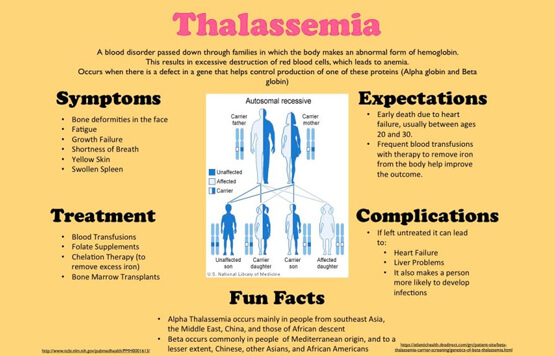Every year on May 8th, World Thalassemia Day raises awareness of thalassemia, a hereditary blood condition characterised by faulty haemoglobin synthesis. Thalassemia impairs the body's capacity to manufacture haemoglobin and red blood cells, resulting in anaemia and other consequences. Thalassemia, a class of inherited blood diseases, affects millions of individuals worldwide. Despite its prevalence, thalassemia remains largely unknown in many areas. On this Thalassemia Day, let's learn more about the illness, its impact on individuals and families, and how we can work together to avoid it.
What is Thalassemia?
Thalassemia is a genetic blood condition with faulty haemoglobin production. Haemoglobin is the protein in red blood cells that transports oxygen. Individuals with thalassemia may generate fewer red blood cells than usual or have haemoglobin abnormalities, resulting in anaemia and other problems.
There are two forms of thalassemia: alpha and beta. These are further grouped according to the severity of the symptoms:
Alpha Thalassemia:
Individuals who possess one faulty gene normally do not suffer symptoms.
Alpha Thalassemia Trait: Mild anaemia may occur.
Hb H disease causes moderate to severe anaemia and associated consequences.
Hydrops fetalis: Severe anaemia before delivery, frequently resulting in stillbirth or death shortly after birth.
Beta Thalassemia:
Thalassemia Minor (Trait): Mild anaemia that is usually asymptomatic.
Thalassemia Intermedia: Moderate to severe anaemia that needs periodic blood transfusions.
Thalassemia Major (Cooley's Anaemia) is a severe anaemia that begins in childhood and requires regular blood transfusions and medical treatment.

Awareness and Prevention:
- Genetic Counselling: Individuals with a family history of thalassemia should seek genetic counselling before beginning a pregnancy. Genetic counsellors can estimate the risk of spreading thalassemia characteristics to children and discuss family planning choices.
- Prenatal Testing: Pregnant women can get prenatal testing to identify thalassemia in their foetus. Early diagnosis enables parents to make more informed decisions regarding pregnancy management and treatment options.
- Carrier Screening: Population-based carrier screening programmes can detect individuals with thalassemia characteristics, allowing them to make informed family planning decisions and seek appropriate medical care.
- Education and knowledge Campaigns: Governments, healthcare organisations, and community groups should work together to promote knowledge of thalassemia, its inheritance patterns, and prevention strategies. Education can enable individuals to make educated decisions, lowering the occurrence of thalassemia in future generations.
- Support for Affected Individuals: People with thalassemia require lifetime medical treatment, which includes regular blood transfusions, iron chelation therapy, and ongoing monitoring for problems. Access to inexpensive healthcare and psychological support services is critical for improving their quality of life.
- Blood Transfusion and Iron Chelation Therapy: Individuals with severe thalassemia require regular blood transfusions to maintain acceptable haemoglobin levels. However, frequent transfusions might cause iron excess, necessitating iron chelation treatment to avoid organ damage.
- Stem cell or bone marrow transplantation: can cure thalassemia in some circumstances, giving hope to people suffering from severe forms of the disease.
Thalassemia is a major worldwide health issue, but its impact can be reduced with more knowledge, education, and preventive actions. On Thalassemia Day and every day, Child Help Foundation along with Filaantro aims to come together to raise awareness, assist afflicted individuals and families, and work towards a future free of thalassemia. Together, we can help battle this inherited blood condition.
